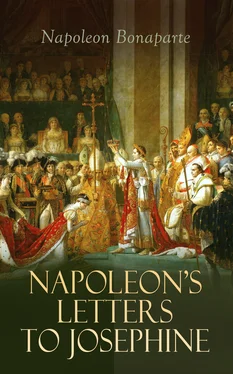Napoleon Bonaparte - Napoleon's Letters to Josephine
Здесь есть возможность читать онлайн «Napoleon Bonaparte - Napoleon's Letters to Josephine» — ознакомительный отрывок электронной книги совершенно бесплатно, а после прочтения отрывка купить полную версию. В некоторых случаях можно слушать аудио, скачать через торрент в формате fb2 и присутствует краткое содержание. Жанр: unrecognised, на английском языке. Описание произведения, (предисловие) а так же отзывы посетителей доступны на портале библиотеки ЛибКат.
- Название:Napoleon's Letters to Josephine
- Автор:
- Жанр:
- Год:неизвестен
- ISBN:нет данных
- Рейтинг книги:3 / 5. Голосов: 1
-
Избранное:Добавить в избранное
- Отзывы:
-
Ваша оценка:
- 60
- 1
- 2
- 3
- 4
- 5
Napoleon's Letters to Josephine: краткое содержание, описание и аннотация
Предлагаем к чтению аннотацию, описание, краткое содержание или предисловие (зависит от того, что написал сам автор книги «Napoleon's Letters to Josephine»). Если вы не нашли необходимую информацию о книге — напишите в комментариях, мы постараемся отыскать её.
Napoleon's Letters to Josephine — читать онлайн ознакомительный отрывок
Ниже представлен текст книги, разбитый по страницам. Система сохранения места последней прочитанной страницы, позволяет с удобством читать онлайн бесплатно книгу «Napoleon's Letters to Josephine», без необходимости каждый раз заново искать на чём Вы остановились. Поставьте закладку, и сможете в любой момент перейти на страницу, на которой закончили чтение.
Интервал:
Закладка:
April 10th.—Campaign opens (Napoleon's available troops about 35,000).
April 11th.—Colonel Rampon, with 1200 men, breaks the attack of D'Argenteau, giving Napoleon time to come up.
April 12th.—Battle of Montenotte, Austrians defeated. Lose 3500 men (2000 prisoners), 5 guns, and 4 stand of colours.
April 14th.—Battle of Millesimo, Austrians and Sardinians defeated. Lose over 6000 prisoners, 2 generals, 4500 killed and wounded, 32 guns, and 15 stand of colours. Lannes made Colonel on the battlefield.
April 15th.—Battle of Dego, the allies defeated and separated.
April 22nd.—Battle of Mondovi, Sardinians defeated. Lose 3000 men, 8 guns, 10 stand of colours.
No. 6.
Carru, April 24th.
To My Sweet Love. —My brother will remit you this letter. I have for him the most lively affection. I trust he will obtain yours; he merits it. Nature has endowed him with a gentle, even, and unalterably good disposition; he is made up of good qualities. I am writing Barras to help him to the Consulate of some Italian port. He wishes to live with his little wife far from the great whirlwind, and from great events. I recommend him to you. I have received your letters of (April) the fifth and tenth. You have been several days without writing me. What are you doing then? Yes, my kind, kind love, I am not jealous, but sometimes uneasy. Come soon. I warn you, if you tarry you will find me ill; fatigue and your absence are too much for me at the same time.
Your letters make up my daily pleasure, and my happy days are not often. Junot bears to Paris twenty-two flags. You ought to return with him, do you understand? Be ready, if that is not disagreeable to you. Should he not come, woe without remedy; should he come back to me alone, grief without consolation, constant anxiety. My Beloved, he will see you, he will breathe on your temples; perhaps you will accord him the unique and priceless favour of kissing your cheek, and I, I shall be alone and very far away; but you are about to come, are you not? You will soon be beside me, on my breast, in my arms, over your mouth. Take wings, come quickly, but travel gently. The route is long, bad, fatiguing. If you should be overturned or be taken ill, if fatigue—go gently, my beloved.
I have received a letter from Hortense. She is entirely lovable. I am going to write to her. I love her much, and I will soon send her the perfumes that she wants.
N. B.
I know not if you want money, for you never speak to me of business. If you do, will you ask my brother for it—he has 200 louis of mine! If you want a place for any one you can send him; I will give him one. Chateau Renard may come too.
A la citoyenne Bonaparte, &c.
April 28th.—Armistice of Cherasco (submission of Sardinia to France): peace signed May 15th.
May 7th.—Bonaparte passed the Po at Placentia, and attacks Beaulieu, who has 40,000 Austrians.
May 8th.—Austrians defeated at Fombio. Lose 2500 prisoners, guns, and 3 standards. Skirmish of Codogno—death of General La Harpe.
May 9th.—Capitulation of Parma by the Grand Duke, who pays ransom of 2 million francs, 1600 artillery horses, food, and 20 paintings.
May 10th.—Passage of Bridge of Lodi. Austrians lose 2000 men and 20 cannon.
May 14th.—Bonaparte was requested to divide his command, and thereupon tendered his resignation.
May 15th.—Bonaparte enters Milan. Lombardy pays ransom of 20 million francs; and the Duke of Modena 10 millions, and 20 pictures.
May 24th-25th.—Revolt of Lombardy, and punishment of Pavia by the French.
May 30th-31st.—Bonaparte defeats Beaulieu at Borghetto, crosses the Mincio, and makes French cavalry fight (a new feature for the Republican troops).
June 3rd.—Occupies Verona, and secures the line of the Adige.
June 4th. —Battle of Altenkirchen (Franconia) won by Jourdan.
June 5th.—Armistice with Naples. Their troops secede from the Austrian army.
No. 7.
To Josephine.
Tortona, Noon, June 15th.
My life is a perpetual nightmare. A presentiment of ill oppresses me. I see you no longer. I have lost more than life, more than happiness, more than my rest. I am almost without hope. I hasten to send a courier to you. He will stay only four hours in Paris, and then bring me your reply. Write me ten pages. That alone can console me a little. You are ill, you love me, I have made you unhappy, you are in delicate health, and I do not see you!—that thought overwhelms me. I have done you so much wrong that I know not how to atone for it; I accuse you of staying in Paris, and you were ill there. Forgive me, my dear; the love with which you have inspired me has bereft me of reason. I shall never find it again. It is an ill for which there is no cure. My presentiments are so ominous that I would confine myself to merely seeing you, to pressing you for two hours to my heart—and then dying with you. Who looks after you? I expect you have sent for Hortense. I love that sweet child a thousand times more when I think she can console you a little, though for me there is neither consolation nor repose, nor hope until the courier that I have sent comes back; and until, in a long letter, you explain to me what is the nature of your illness, and to what extent it is serious; if it be dangerous, I warn you, I start at once for Paris. My coming shall coincide with your illness. I have always been fortunate, never has my destiny resisted my will, and to-day I am hurt in what touches me solely ( uniquement ). Josephine, how can you remain so long without writing to me; your last laconic letter is dated May 22. Moreover, it is a distressing one for me, but I always keep it in my pocket; your portrait and letters are perpetually before my eyes.
I am nothing without you. I scarcely imagine how I existed without knowing you. Ah! Josephine, had you known my heart would you have waited from May 18th to June 4th before starting? Would you have given an ear to perfidious friends who are perhaps desirous of keeping you away from me? I openly avow it to every one, I hate everybody who is near you. I expected you to set out on May 24th, and arrive on June 3rd.
Josephine, if you love me, if you realise how everything depends on your health, take care of yourself. I dare not tell you not to undertake so long a journey, and that, too, in the hot weather. At least, if you are fit to make it, come by short stages; write me at every sleeping-place, and despatch your letters in advance.
All my thoughts are concentrated in thy boudoir, in thy bed, on thy heart. Thy illness!—that is what occupies me night and day. Without appetite, without sleep, without care for my friends, for glory, for fatherland, you, you alone—the rest of the world exists no more for me than if it were annihilated. I prize honour since you prize it, I prize victory since it pleases you; without that I should leave everything in order to fling myself at your feet.
Sometimes I tell myself that I alarm myself unnecessarily; that even now she is better, that she is starting, has started, is perhaps already at Lyons. Vain fancies! you are in bed suffering, more beautiful, more interesting, more lovable. You are pale and your eyes are more languishing, but when will you be cured? If one of us ought to be ill it is I—more robust, more courageous; I should support illness more easily. Destiny is cruel, it strikes at me through you.
What consoles me sometimes is to think that it is in the power of destiny to make you ill; but it is in the power of no one to make me survive you.
In your letter, dear, be sure to tell me that you are convinced that I love you more than it is possible to imagine; that you are persuaded that all my moments are consecrated to you; that to think of any other woman has never entered my head—they are all in my eyes without grace, wit, or beauty; that you, you alone, such as I see you, such as you are, can please me, and absorb all the faculties of my mind; that you have traversed its whole extent; that my heart has no recess into which you have not seen, no thoughts which are not subordinate to yours; that my strength, my prowess, my spirit are all yours; that my soul is in your body; and that the day on which you change or cease to live will be my death-day; that Nature, that Earth, is beautiful only because you dwell therein. If you do not believe all this, if your soul is not convinced, penetrated by it, you grieve me, you do not love me—there is a magnetic fluid between people who love one another—you know perfectly well that I could not brook a rival, much less offer you one.15 To tear out his heart and to see him would be for me one and the same thing, and then if I were to carry my hands against your sacred person—no, I should never dare to do it; but I would quit a life in which the most virtuous of women had deceived me.
Читать дальшеИнтервал:
Закладка:
Похожие книги на «Napoleon's Letters to Josephine»
Представляем Вашему вниманию похожие книги на «Napoleon's Letters to Josephine» списком для выбора. Мы отобрали схожую по названию и смыслу литературу в надежде предоставить читателям больше вариантов отыскать новые, интересные, ещё непрочитанные произведения.
Обсуждение, отзывы о книге «Napoleon's Letters to Josephine» и просто собственные мнения читателей. Оставьте ваши комментарии, напишите, что Вы думаете о произведении, его смысле или главных героях. Укажите что конкретно понравилось, а что нет, и почему Вы так считаете.












